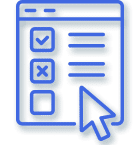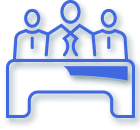What does a licensed Addiction Counselor LAC in North Dakota state do? What is Their Job Role?
As you begin your professional career working as a licensed addiction counselor, the state has particular rules and regulations you need to follow. This keeps you in good standing as a counselor in North Dakota.
Compare Popular Online Substance Abuse Counseling Programs
Overview
Before you begin to work in North Dakota, you’ll need to apply for your license. If this is your first position as a counselor, you’ll receive a temporary license that covers you before you take your licensing exam.
It’s pretty likely that you decided to enter the licensed addiction counselor field before starting college. If you had this plan in mind, you received advising from a faculty member who guided you about the required classes you needed. These courses gave you the foundation for your career—from the theory to the practical, you learned about human development, licensed addiction counselor methods and how addiction develops and grows. The classes you took will also help you as you study for your licensure examination. Keep your textbooks, because you will be reviewing from them as you prepare for this all-important test.
Even experienced licensed addiction counselors are expected to undergo clinical supervision. A more-experienced counselor will direct your clinical supervision. In fact, this person may even be your direct supervisor in the facility where you work.
In North Dakota, once you have taken your licensure exam, you’re not done with learning. North Dakota, as well as every other state in the U.S., requires its professional substance abuse counselors to take part in educational opportunities. From seminars to training conferences, you need to apply to take continuing education courses. Keep track of your continuing education hours, because you’ll need to document each class or seminar you took part in. Every two years, you’ll have to submit your continuing education hours so you can renew your North Dakota license to practice.
North Dakota Licensing & Certifications for Associates & Independent Counselors

In July of 2016, North Dakota altered its licensure levels. Before this date, North Dakota had only one substance abuse counselor level— licensed addiction counselor.
The licensing board (North Dakota State Board of Addiction Counseling, or NDBACE) decided that, if its licensed addiction counselors were categorized in tiered levels, then out-of-state counselors would find it much easier to obtain their needed licensing so they could begin to work right away.
Under the old method, licensed addiction counselors were required to complete additional clinical or academic training before they could begin working. This put a strain on incoming counselors, as well as North Dakota.
Students still in college are now able to remain in trainee status for an additional year as they complete their educations.
Finally, the new substance abuse counselor career ladder enables applicants from other states to begin working much earlier.
Before July 2016, the only license available for addiction counselors was the LAC or licensed addiction counselor. After this date, North Dakota State Board of Addiction Counseling now recognizes recovery coaches, addiction counselor trainees (ACT), licensed addiction counselor (LAC) and master addiction counselors (MAC).
Education Requirements

Licensure levels weren’t the only thing that changed in 2016. Educational requirements did as well. Under the old requirements (for ACT, LAC and MAC levels):
Three credits of theory and techniques of treatment; evidence-based treatment methods and models, especially those associated with addictions;
Assessment and diagnostic models based on current diagnostic and statistical manual of the American Psychiatric Association (DSM-5) to include substance-related mental disorders;
- Latest American Society of Addiction medicine patient criteria;
- Interviewing process, skills and techniques;
- Ability to conduct individual counseling sessions;
- Testing instruments (psychosocial tests);
- Documenting, report writing and keeping records;
- Verbal communication skills;
- Minimum of three group counseling skills credits;
- Minimum of three credits on psychopharmacology;
- Minimum of three credits on dynamics of addiction, covering historical perspectives of models of addiction; community support and self-help for people with substance abuse disorders; Contagious diseases related to substance abuse.
Under the old requirements, you would also have had to take a minimum of three credits on co-occurring disorders, to include: assessment and diagnosis models in substance related disorders and any co-occurring mental conditions (based on current DSM-5); psychopathology, mental health and mental illness in the child, adolescent and adult populations.
In addition, you would have had to complete a minimum of two credits over professional ethics, to include federal and state regulations on addiction counseling, professional competence and standards, ethics and codes of conduct, values and societal expectations, malpractice and liability, and ethical decision making.
- At least three credits on human lifespan development.
- And a minimum of three credits over family systems (family types, family function and addiction in families).
- At least three credits covering cultural competence and counseling, and multicultural diversity.
The proposed guidelines require at least three credits over theory and techniques of addiction treatment, to include American Society of Addiction Medicine (ASAM) criteria.
Find Your Online Addiction Counseling Program
New guidelines include three credits on group counseling skills, three credits on psychopharmacology and a minimum of three credits on dynamics of addiction OR the study of alcohol use/abuse.
The proposed guidelines now recommend a minimum of three credits on co-occurring disorders, abnormal psychology and psychopathology.
- At least three credits over professional ethics has also been proposed.
- Also proposed: At least three credits on human development over the entire lifespan.
- A minimum of three credits on family systems has also been proposed.
- Finally, at least three credits on cultural competence in counseling and multicultural diversity has also been proposed.
The new guidelines greatly simplify educational requirements for students considering a career in addiction counseling.
CACREP Accredited Online Certification

Two types of accreditation are recognized in the United States; institutional and specialized. Institutional accreditation takes the entire institution into account while the specialized focus on professional preparation programs. The Council for Accreditation of Counseling and Related Educational Programs (CACREP) is a specialized accreditation that focuses on master's degree program and doctoral degree programs in substance abuse counseling at colleges and universities worldwide. Only already-accredited institutions are eligible for CACREP review. The review for accreditation will center on programs offering graduate degrees in substance abuse counseling.
Choosing a CACREP-accredited program ensures that the program meets the highest of quality standards. Many substance abuse counseling specialties are accredited by the CACREP, including addiction counseling. Accredited addiction counseling programs prepare individuals to work with those affected by addictive behavior and their families. Addictive behaviors include alcohol, drugs, food, gambling, sex, and anything else that negatively affects your personal or work life by creating addiction behaviors.
CACREP-accredited programs will focus on treatment models and the phases of addiction including prevention, recovery, and relapse prevention. These 60-semester hour programs will include the application of interventions. When students choose a CACREP-accredited program they can be confident that:
- the program meets or exceeds national standards
- the program will focus on professional substance abuse counseling rather than psychology oreducation
- the program has an excellent reputation
- CACREP graduates statistically receive higher scores on the National Counselor Examination for Licensure and Certification (NCE).
- the requirements for licensure will be met.
Board of Counselor Examiners (NDBCE)
The NDBCE was established to regulate the private practice of professional substance abuse counseling throughout North Dakota. Their mission is to ensure that substance abuse counseling practices are “competent, safe, and ethical.” The North Dakota State Board of Addiction Counseling sets licensure requirements and provides examinations for new candidates as well as setting standards for existing practices. The NDBCE also creates and monitors continuing education requirements and investigates any complaints brought against mental health professionals.
Address
2112 10th Ave SE
Mandan, ND 58554
Phone
(701) 667-5969
Website Address
Licensure:
- Licensed Professional Clinical Counselor (LPCC)
- Licensed Professional Counselor (LPC)
- Licensed Associate Professional Counselor (LAPC)
Counselor Testing & Examination Process

The NDBACE requires all addiction counselors to be licensed before beginning to practice. Once licensed, they are referred to as “licensed addiction counselors.”
Every licensed addiction counselor must have a college degree and the equivalent of about one year of academic study in addiction. North Dakota now encourages its addiction counselors to seek national certification from the Association of Addiction Professionals—this certification is now being required by more employers.
When you come in to take your licensure exam, you’ll be tested with the exam that was developed by the Association of Addiction Counselors. Depending on where you live and work, you’ll take your exam in Fargo or Minot.
In applying to take the exam, you download the application from the North Dakota Board of Addiction Counseling Examiners website, then provide three professional references. One of these has to come from a clinical supervisor, either past or present. Include all references on a Board-supplied form.
Request your official transcripts from the university where you graduated. Your transcript must be sent straight to the North Dakota State Board of Addiction Counseling. If you are moving to North Dakota from another state, provide verification of your credentials to practice.
Read and sign the North Dakota Board of Addiction Counseling Examiners code of ethics.
Submit your application electronically or via snail mail.
Clinical Supervision Explained

Clinical supervision in North Dakota works much as it works anywhere else. Addiction counselor trainees, licensed addiction counselors and master's degree program addiction counselors are required to be supervised by a direct supervisor. If there is no direct supervisor in their office, they can be supervised electronically by a supervising clinician from another location.
Under the laws applicable before July 2016, licensed addiction counselors were supposed to be completed through one of seven NDBACE-approved clinical training consortiums. The North Dakota State Board of Addiction Counseling can also approve an individualized training plan for a counselor.
Under the proposed changes, clinical training can be completed through the North Dakota Board of Addiction Counseling Examiners consortiums, an individualized training plan (that the NDBACE has approved), in a university placement or in a consortium.
Both bachelor's degree level and master's degree program level trainings are no longer required to log 1,400 hours of clinical training. Bachelor's degree level trainees must complete 960 hours and master's degree program level trainees, 700 hours.
Renewal and Continuing Education

North Dakota’s Board of Addiction Counseling Examiners requires every addiction counselor to obtain a license to practice before they begin working as licensed addiction counselors. Licenses expire on the 31st of December of every odd-numbered year; every counselor should have provided proof of their completed continuing education hours before the expiration of their license.
When it’s time to renew your license, complete your continuing education requirements as established by the North Dakota State Board of Addiction Counseling and pay your renewal fee. As long as your license is in good standing, it will be renewed as long as you sent your renewal materials in before your license expires.
Every LAC is required to complete 40 CE hours to be eligible to renew their license to practice addiction counseling.
Twenty of these hours are required if you were first licensed between January 1st and June 30th of an odd-numbered year. You don’t need any CE hours if you were first licensed on or after July 1 in an odd-numbered year.
You can’t earn any [new}] CE hours until after your license’s effective date. You’ll only be able to earn CE hours within your current licensing period. You can only apply current CE hours to one licensing period—they cannot be reused in a new licensing period.
To qualify for CE hours, all hours must be related to addiction counseling, best private practice techniques or behavioral mental health. You can earn your hours in seminars, webinars and workshops. Your CE hours must enable you to increase your proficiency to private practice addiction counseling.
Shortly before the end of your two-year reporting cycle, you are required to submit a signed statement on a Board-provided form. This form certifies the satisfaction of your CE requirement. Show your compliance with CE hours by listing every activity that you took part in to earn your CE hours, as well as the amount of credits claimed for each activity. Include the date(s) of each educational session.
Potential Counselor Career Path Options
- Addiction Counselor
- Alcohol and Drug Addiction Counselor
- Behavioral Health Specialist
- Certified Addiction Drug and Alcohol Counselor
- Chemical Dependency Counselor
- Mental Health Counselor
- School Counselor
- Substance Abuse Counselor
Associations & Organizations
North Dakota has one substance abuse counselors’ association within its borders: The North Dakota Addiction Counselor Association. This is the state’s affiliate of the National Association for Addiction Professionals.
This association works hard to make the general public aware of addiction professionals as it helps addiction counselors to unite throughout North Dakota.
Addiction counseling is a difficult field to work in. When addiction counselors can work together, they provide much-needed support to each other.
